-
 Bitcoin
Bitcoin $83,649.7703
-1.06% -
 Ethereum
Ethereum $1,818.4708
-2.72% -
 Tether USDt
Tether USDt $1.0000
0.01% -
 XRP
XRP $2.0495
-3.21% -
 BNB
BNB $597.8591
-1.20% -
 Solana
Solana $118.6021
-5.26% -
 USDC
USDC $1.0000
0.01% -
 Dogecoin
Dogecoin $0.1642
-3.52% -
 Cardano
Cardano $0.6526
-2.99% -
 TRON
TRON $0.2343
-0.56% -
 Toncoin
Toncoin $3.7346
-7.00% -
 UNUS SED LEO
UNUS SED LEO $9.4260
0.63% -
 Chainlink
Chainlink $12.9796
-3.63% -
 Stellar
Stellar $0.2617
-1.79% -
 Avalanche
Avalanche $18.3920
-4.15% -
 Sui
Sui $2.3105
-2.61% -
 Shiba Inu
Shiba Inu $0.0...01222
-0.74% -
 Hedera
Hedera $0.1630
-1.67% -
 Litecoin
Litecoin $83.6143
1.85% -
 Polkadot
Polkadot $4.0068
-2.05% -
 MANTRA
MANTRA $6.3564
2.37% -
 Bitcoin Cash
Bitcoin Cash $306.7380
0.76% -
 Bitget Token
Bitget Token $4.5736
-0.36% -
 Dai
Dai $1.0001
0.01% -
 Ethena USDe
Ethena USDe $0.9998
0.00% -
 Pi
Pi $0.6284
-6.81% -
 Hyperliquid
Hyperliquid $11.9330
-10.11% -
 Monero
Monero $213.7810
-0.49% -
 Uniswap
Uniswap $5.9757
-2.02% -
 Aptos
Aptos $5.2294
-1.01%
How can Chinese investors buy Bitcoin ETFs through RQFII?
RQFII allows indirect Bitcoin ETF investment via a complex process involving intermediaries and international funds, but no ETFs are listed on Chinese exchanges.
Mar 31, 2025 at 12:21 pm
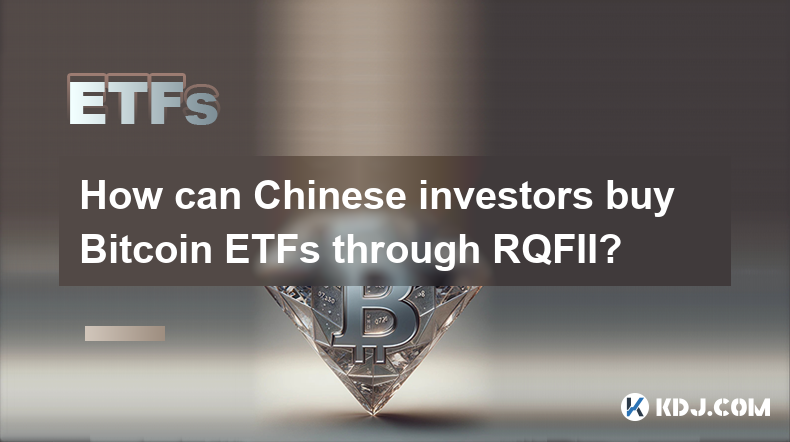
Understanding RQFII and Bitcoin ETFs
The Renminbi Qualified Foreign Institutional Investor (RQFII) scheme allows eligible foreign institutional investors to invest in China's financial markets using the Renminbi (RMB). While it doesn't directly facilitate Bitcoin ETF purchases, it opens avenues for indirect exposure. Currently, no Bitcoin ETFs are directly listed on mainland Chinese exchanges. Therefore, accessing Bitcoin through RQFII requires a multi-step approach, focusing on international exchanges where Bitcoin ETFs are available.
The Indirect Route to Bitcoin ETF Investment via RQFII
Chinese investors cannot directly buy Bitcoin ETFs listed on exchanges like the NYSE or Nasdaq through RQFII. The RQFII program primarily regulates RMB investments within the Chinese market. To gain exposure to Bitcoin ETFs, investors need to utilize a more complex strategy involving intermediaries. This usually involves investing in funds or vehicles that themselves hold Bitcoin ETFs.
Steps for Indirect Access (Illustrative Example)
This process is complex and requires significant financial expertise and understanding of international investment regulations. It's crucial to consult with qualified financial advisors before proceeding. The following steps are illustrative and might not reflect the exact process in all cases:
- Step 1: Identify an eligible RQFII investment vehicle: Find a fund or investment product approved under the RQFII scheme that invests in international markets, potentially including those with exposure to Bitcoin. This is crucial and may require significant research and due diligence.
- Step 2: Establish an account with an RQFII-approved institution: You need to open an account with a financial institution authorized to participate in the RQFII program. This institution will manage your RMB investments and facilitate the investment in the chosen vehicle.
- Step 3: Invest in the chosen vehicle: Once your account is set up, you can invest your RMB funds into the selected investment vehicle that indirectly provides exposure to Bitcoin ETFs. Remember that the level of Bitcoin ETF exposure will vary depending on the vehicle's investment strategy.
- Step 4: Monitor your investment: Regularly monitor the performance of your investment and stay updated on any changes in market conditions or regulatory frameworks. This is vital for managing risk and making informed decisions.
Regulatory Hurdles and Considerations
The Chinese government maintains strict capital controls, and the regulatory landscape concerning cryptocurrencies remains uncertain. The availability of suitable RQFII investment vehicles with Bitcoin ETF exposure is limited, and the process is subject to change based on evolving regulations. Investors should be aware of the potential risks involved, including regulatory changes, market volatility, and the inherent risks associated with cryptocurrency investments. Always prioritize working with reputable and licensed financial institutions.
Understanding the Risks
Investing in Bitcoin ETFs, even indirectly through RQFII, carries substantial risks. The cryptocurrency market is known for its volatility, and the value of Bitcoin can fluctuate significantly in short periods. Regulatory uncertainty in both China and globally adds to the risk profile. Diversification is crucial to mitigate potential losses. Never invest more than you can afford to lose.
The Role of Intermediaries
The success of this indirect approach hinges heavily on the selection of appropriate intermediaries. These include:
- RQFII-approved institutions: These institutions are responsible for managing the RMB investment process and ensuring compliance with regulations.
- International investment funds: These funds will hold the Bitcoin ETFs and provide the indirect exposure for Chinese investors.
- Custodians: These entities safeguard the assets held within the investment vehicles. Due diligence is essential when selecting each intermediary to minimize counterparty risk.
Alternatives to RQFII for Bitcoin Exposure
While RQFII offers a pathway, it’s not the only one. Other, albeit potentially riskier, options for Chinese investors seeking Bitcoin exposure include:
- Over-the-counter (OTC) trading: This involves directly buying Bitcoin from other individuals or entities, often outside regulated markets. This carries significant risks, including fraud and lack of regulatory protection.
- International exchanges: Accessing international cryptocurrency exchanges directly, which requires navigating complex regulations and potential legal issues. This is generally not recommended due to the significant legal and security risks involved.
Frequently Asked Questions
Q: Are there any Bitcoin ETFs listed on mainland Chinese exchanges?
A: No, currently there are no Bitcoin ETFs listed on mainland Chinese exchanges. The regulatory environment in China remains restrictive concerning cryptocurrencies.
Q: What are the risks associated with using RQFII for indirect Bitcoin ETF investment?
A: Risks include regulatory uncertainty in both China and international markets, market volatility of Bitcoin, counterparty risk associated with intermediaries, and the complexity of the investment process.
Q: Is it legal for Chinese investors to invest in Bitcoin ETFs through RQFII?
A: The legality depends on the specific investment vehicle and compliance with both Chinese and international regulations. It's crucial to consult legal and financial professionals.
Q: What are the fees involved in this process?
A: Fees will vary depending on the chosen investment vehicle, the RQFII institution, and other intermediaries. Expect fees associated with account management, fund management, and potential transaction costs.
Q: How can I find an eligible RQFII investment vehicle with Bitcoin ETF exposure?
A: This requires extensive research and professional financial advice. Consult with financial advisors specializing in international investments and RQFII schemes. Thorough due diligence is essential.
Disclaimer:info@kdj.com
The information provided is not trading advice. kdj.com does not assume any responsibility for any investments made based on the information provided in this article. Cryptocurrencies are highly volatile and it is highly recommended that you invest with caution after thorough research!
If you believe that the content used on this website infringes your copyright, please contact us immediately (info@kdj.com) and we will delete it promptly.
- FDUSD, BTC, TUSD, SEI, and LINK are the top 5 virtual asset-related keywords attracting the most interest
- 2025-04-03 15:45:12
- Bitcoin Pepe (BPEP) could hit $250 in four years
- 2025-04-03 15:45:12
- TAO Breaks Resistance, HYPE Dips 14%— Yet BlockDAG PullS in $210M Following Keynote 3 Launch!
- 2025-04-03 15:40:13
- Dogecoin (DOGE) Price Prediction: An Analyst Highlights a Bullish Divergence, Suggesting a Rally Could Be in the Cards
- 2025-04-03 15:40:13
- XRP Navigates Volatile Waters, Targeting a Breakout From Its Range
- 2025-04-03 15:35:27
- Meme Cryptocurrency Dogecoin DOGE/USD Falls After President Donald Trump's Tariff Shock, Extending Weekly Losses to Over 16%
- 2025-04-03 15:35:27
Related knowledge
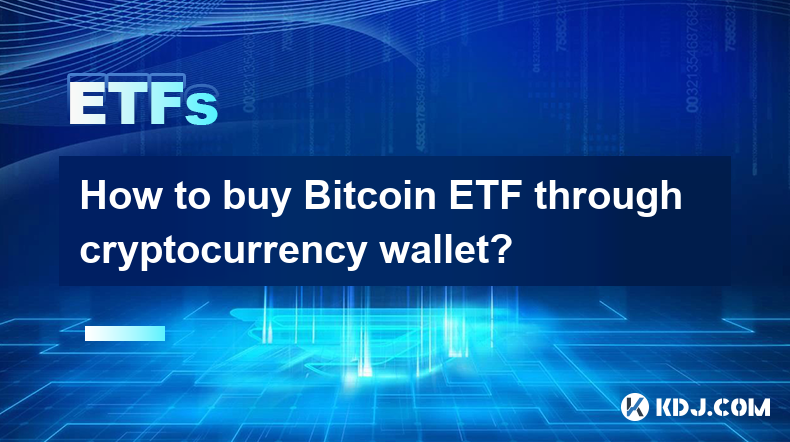
How to buy Bitcoin ETF through cryptocurrency wallet?
Mar 30,2025 at 08:22pm
It's important to understand that you cannot directly buy a Bitcoin ETF through a cryptocurrency wallet. Cryptocurrency wallets are designed to hold and manage digital assets like Bitcoin itself, not exchange-traded funds (ETFs). Bitcoin ETFs are traded on traditional stock exchanges, not decentralized cryptocurrency exchanges. Therefore, the process i...
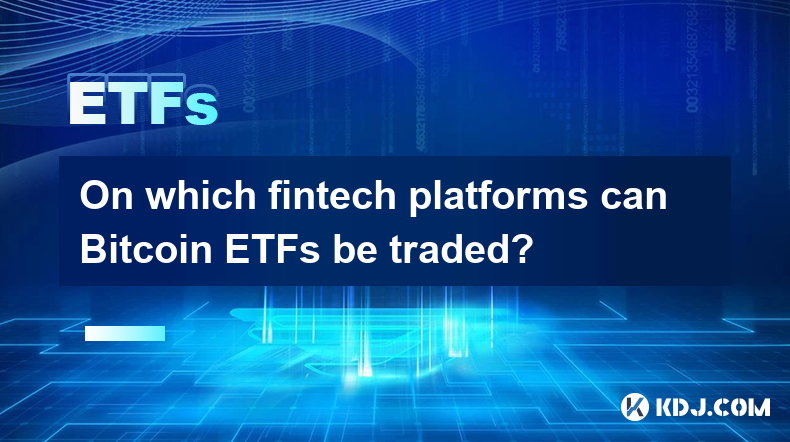
On which fintech platforms can Bitcoin ETFs be traded?
Mar 28,2025 at 09:21am
Navigating the Bitcoin ETF Landscape on Fintech PlatformsThe availability of Bitcoin ETFs on fintech platforms is a rapidly evolving landscape. Currently, the approval and subsequent listing of Bitcoin ETFs are subject to regulatory hurdles and vary significantly by jurisdiction. Therefore, the specific platforms offering Bitcoin ETF trading depend hea...
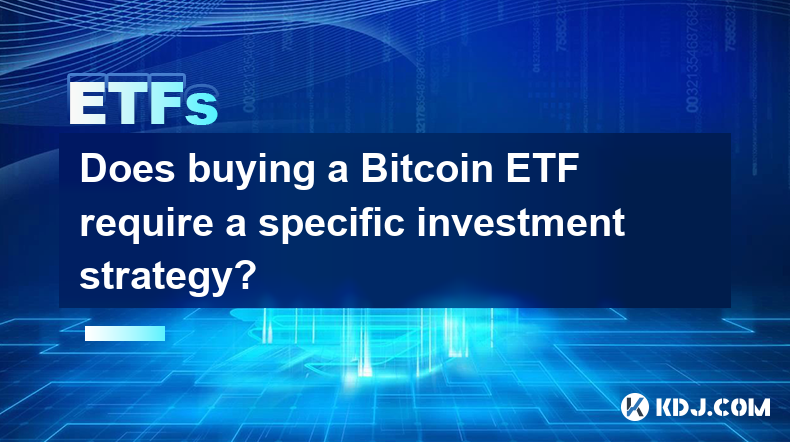
Does buying a Bitcoin ETF require a specific investment strategy?
Mar 27,2025 at 06:36pm
Understanding Bitcoin ETFs and Investment StrategiesA Bitcoin Exchange-Traded Fund (ETF) is a type of investment fund that tracks the price of Bitcoin. Investing in a Bitcoin ETF offers exposure to the cryptocurrency market without the complexities of directly owning and securing Bitcoin. However, like any investment, a successful strategy requires car...
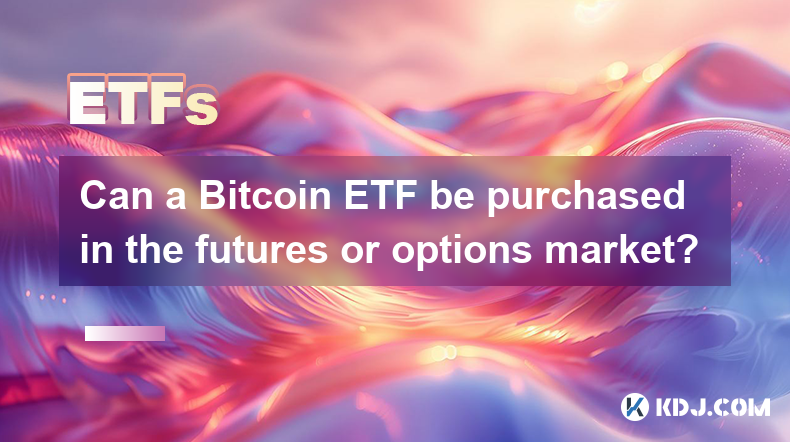
Can a Bitcoin ETF be purchased in the futures or options market?
Mar 27,2025 at 02:49am
Understanding Bitcoin ETFs and Derivative MarketsA Bitcoin ETF (Exchange-Traded Fund) is a fund that tracks the price of Bitcoin. Unlike directly buying Bitcoin, an ETF offers a more regulated and accessible way for investors to gain exposure to the cryptocurrency market through traditional brokerage accounts. However, the availability of a Bitcoin ETF...
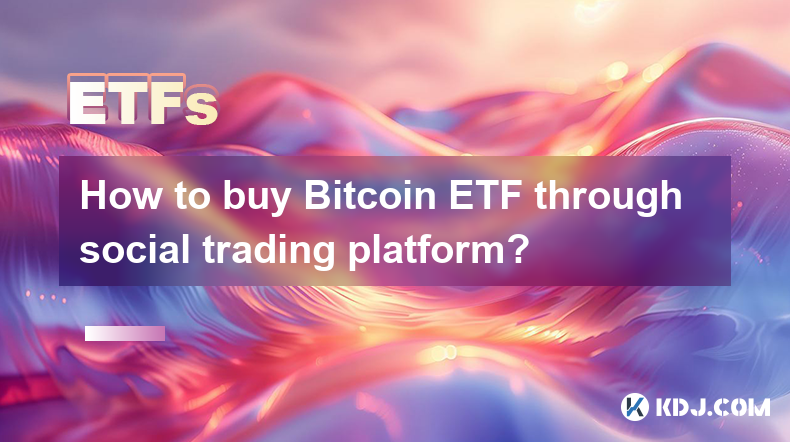
How to buy Bitcoin ETF through social trading platform?
Mar 27,2025 at 10:43am
How to Buy Bitcoin ETF Through Social Trading Platforms? Understanding Bitcoin ETFs and Social TradingA Bitcoin ETF (Exchange-Traded Fund) is a fund that tracks the price of Bitcoin. Unlike directly buying Bitcoin, an ETF offers a regulated and potentially less volatile way to gain exposure to the cryptocurrency market. This is because ETFs are traded o...
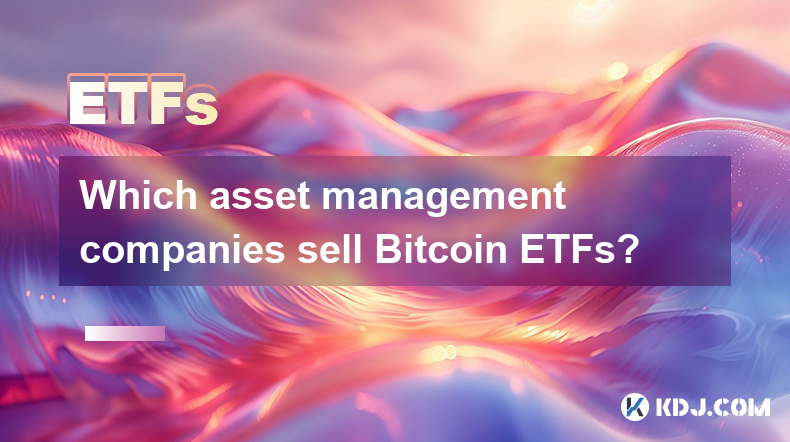
Which asset management companies sell Bitcoin ETFs?
Mar 28,2025 at 02:21am
The Current Landscape of Bitcoin ETF OfferingsCurrently, no asset management company offers a fully-fledged, SEC-approved Bitcoin ETF in the United States. While several companies have filed applications, the Securities and Exchange Commission (SEC) has yet to approve any. This is primarily due to concerns surrounding market manipulation, investor prot...

How to buy Bitcoin ETF through cryptocurrency wallet?
Mar 30,2025 at 08:22pm
It's important to understand that you cannot directly buy a Bitcoin ETF through a cryptocurrency wallet. Cryptocurrency wallets are designed to hold and manage digital assets like Bitcoin itself, not exchange-traded funds (ETFs). Bitcoin ETFs are traded on traditional stock exchanges, not decentralized cryptocurrency exchanges. Therefore, the process i...

On which fintech platforms can Bitcoin ETFs be traded?
Mar 28,2025 at 09:21am
Navigating the Bitcoin ETF Landscape on Fintech PlatformsThe availability of Bitcoin ETFs on fintech platforms is a rapidly evolving landscape. Currently, the approval and subsequent listing of Bitcoin ETFs are subject to regulatory hurdles and vary significantly by jurisdiction. Therefore, the specific platforms offering Bitcoin ETF trading depend hea...

Does buying a Bitcoin ETF require a specific investment strategy?
Mar 27,2025 at 06:36pm
Understanding Bitcoin ETFs and Investment StrategiesA Bitcoin Exchange-Traded Fund (ETF) is a type of investment fund that tracks the price of Bitcoin. Investing in a Bitcoin ETF offers exposure to the cryptocurrency market without the complexities of directly owning and securing Bitcoin. However, like any investment, a successful strategy requires car...

Can a Bitcoin ETF be purchased in the futures or options market?
Mar 27,2025 at 02:49am
Understanding Bitcoin ETFs and Derivative MarketsA Bitcoin ETF (Exchange-Traded Fund) is a fund that tracks the price of Bitcoin. Unlike directly buying Bitcoin, an ETF offers a more regulated and accessible way for investors to gain exposure to the cryptocurrency market through traditional brokerage accounts. However, the availability of a Bitcoin ETF...

How to buy Bitcoin ETF through social trading platform?
Mar 27,2025 at 10:43am
How to Buy Bitcoin ETF Through Social Trading Platforms? Understanding Bitcoin ETFs and Social TradingA Bitcoin ETF (Exchange-Traded Fund) is a fund that tracks the price of Bitcoin. Unlike directly buying Bitcoin, an ETF offers a regulated and potentially less volatile way to gain exposure to the cryptocurrency market. This is because ETFs are traded o...

Which asset management companies sell Bitcoin ETFs?
Mar 28,2025 at 02:21am
The Current Landscape of Bitcoin ETF OfferingsCurrently, no asset management company offers a fully-fledged, SEC-approved Bitcoin ETF in the United States. While several companies have filed applications, the Securities and Exchange Commission (SEC) has yet to approve any. This is primarily due to concerns surrounding market manipulation, investor prot...
See all articles























































































